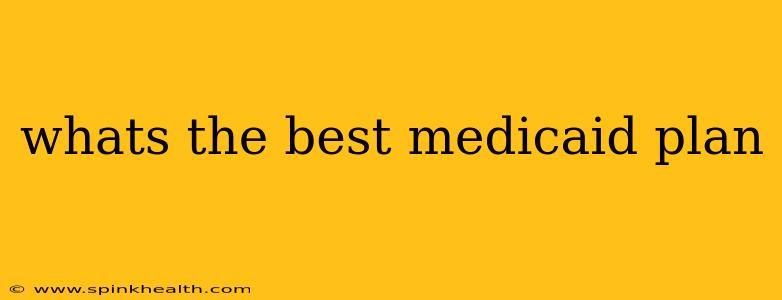Finding the Best Medicaid Plan: A Personal Journey
The quest for the "best" Medicaid plan isn't a simple one-size-fits-all answer. Think of it like searching for the perfect pair of shoes – what fits perfectly on one person might be completely uncomfortable for another. The ideal Medicaid plan hinges entirely on your individual needs and circumstances. There's no single "best" plan, but understanding the variables involved can help you find the one that's best for you.
Let's embark on this journey together, exploring the key factors that determine the right Medicaid plan and addressing some common questions.
What factors influence which Medicaid plan is best for me?
This is where the personalization begins. Several factors will significantly impact which Medicaid plan suits you best:
-
Your location: Medicaid is a state-run program, meaning eligibility criteria and the specific plans available vary widely depending on where you live. A plan that's excellent in California might not even exist in Florida.
-
Your health needs: Do you have chronic conditions requiring specialized care? Do you need frequent doctor visits or hospitalizations? Some plans offer better coverage for specific conditions or provide access to preferred providers.
-
Your income and family size: Your eligibility for Medicaid and the specific plan options available will depend on your income and household size. Eligibility limits and income thresholds vary by state.
What are the different types of Medicaid plans?
Medicaid programs often include different options, each with its own set of features and restrictions. These may include:
-
Fee-for-service Medicaid: This traditional model reimburses healthcare providers for each service rendered. You can see any doctor or specialist who accepts Medicaid.
-
Managed care Medicaid: This model uses health maintenance organizations (HMOs) or preferred provider organizations (PPOs). You'll usually have a primary care physician (PCP) who coordinates your care. This often involves choosing a network of providers. While limiting choice, this approach can sometimes offer better benefits.
-
Dual eligible individuals (Medicare and Medicaid): Individuals who qualify for both Medicare and Medicaid have unique plan options designed to coordinate benefits.
How do I find out what Medicaid plans are available in my area?
Your state's Medicaid agency is your primary resource. Their website is your best starting point. Many states have online portals where you can check your eligibility and explore available plans. You might also want to contact your local health department or community health centers for assistance navigating the process.
What is the process of applying for Medicaid?
The application process varies by state, but typically involves providing information about your income, household size, and health status. Your state's Medicaid agency will guide you through the application, determining your eligibility and helping you select a suitable plan.
Can I change my Medicaid plan?
Generally, yes, you can usually change your Medicaid plan during open enrollment periods, or if you experience a significant change in your circumstances (such as a change in income or health needs). Check with your state's Medicaid agency for details on changing plans.
What services are covered under a Medicaid plan?
Medicaid covers a wide range of essential health services, including doctor visits, hospital care, prescription drugs, mental health services, and substance abuse treatment. The specifics of what's covered can vary by state and plan.
Finding the "best" Medicaid plan is a journey of self-discovery. Understanding your unique needs and exploring the options available in your area will ultimately guide you toward the plan that provides the optimal healthcare coverage for your situation. Remember, seeking assistance from your state’s Medicaid agency or other local resources is crucial in making an informed decision.

